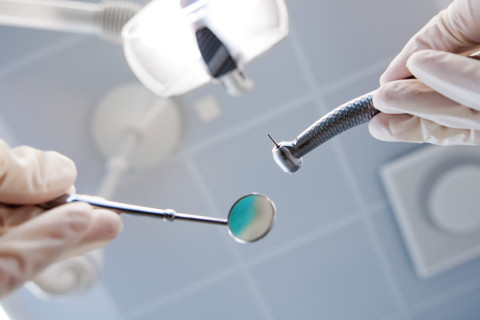Diseases can be predicted from the oral microbiome in the future
Oral inflammatory diseases have been linked to, e.g., cardiovascular diseases and diabetes. “The significance of the oral microbiome is of great interest right now. We are just starting to understand how wide the spectrum of microbes is,” Professor of Translational Dentistry Pirkko Pussinen says.
The professorship in translational dentistry established at the University of Eastern Finland is the first of its kind in Finland. Pirkko Pussinen was invited to the post, which she took up in May.
“In translational research, basic research gets linked with clinical work with patients. My own research can also be considered translational, between the mouth and the rest of the body.”
Pussinen studies the significance of the most common chronic oral diseases – periodontitis and caries – for general health. There is already plenty of evidence on the association of periodontitis, or periodontal disease, with other diseases.
“Periodontitis is known to increase the risk of cardiovascular diseases by 20–50%, for example.”
Various studies have also linked periodontitis to diabetes, stroke, elevated blood pressure, disturbed lipid metabolism, pneumonia, dementia, fatty liver disease and cancer.
“Untreated oral inflammation causes and maintains a slight inflammatory state throughout the body, which makes one susceptible to many diseases.”
Caries and periodontitis are biofilm diseases resulting from an unbalanced oral microbiome. In addition to a local inflammation in the mouth, harmful bacteria cause a wider inflammatory and immune response in the body, which may also lead to autoimmunity that damages tissues. Bacteria and parts of them spread from the mouth to other parts of the body, including circulation and, through saliva, the gastrointestinal tract. Bacteria can also invade inflammatory cells and travel with them.
The spectrum of microbes we know has expanded a lot, but much remains to be charted.
Pirkko Pussinen
Professor

“The role of the oral-gut connection in chronic diseases is a hot topic right now. The entire gastrointestinal system is basically just one tract, and the same bacteria have been found in both the mouth and the gut. It is not yet known where the development of an abnormal strain of bacteria begins, and whether it occurs in the gut and the mouth at the same time.”
Thanks to the rapid recent development of research methods, new opportunities for investigating the oral microbiome, i.e., all oral microbial species, have opened up.
“New methods can be used, for example, to sequence a saliva sample for the genomes of the human and all microbes at the same time. The spectrum of species we know has expanded a lot, but much remains to be charted. In addition, our understanding of what constitutes a healthy or an abnormal oral microbiome expands.”
“For example, 60% of people are thought to have oral fungi. In our research, we’ve found oral fungi, and many different species of them, in all patients studied.”
In an ongoing project, Pussinen’s research group conducts saliva microbiome analyses to explore whether the oral microbiome is associated with cryptogenetic stroke, i.e., stroke whose causes remain unknown.
“The patients in our case-control study are people who have had a stroke before the age of 50, and with no known risk factors. Results from the study will become available this summer. We are also conducting an extensive study on metabolic changes associated with periodontitis.
The spectrum of species in the oral microbiome, and the associations of oral diseases with other diseases, may also depend on genes.
“A certain genetic background, for example, could make one susceptible to both periodontitis and cardiovascular diseases.”
The genetics of oral diseases is being studied in the FinnGen project, which collects and makes available to researchers genome and health data from half a million Finns.
“Until now, the genetics of oral diseases has been studied with relatively small data, and with modest results. The FinnGen data is unique even by global comparison,” says Pussinen, who chairs the FinnGen project’s clinical group of experts in dentistry.
According to Pussinen, studying the genetic background of oral diseases may in the future enable more individual treatment options, as well as investments in disease prevention – especially in those at an increased risk. She is currently applying for funding for a project related to personalised dentistry, which seeks to identify microbial and genetic markers that anticipate the development of caries and periodontitis from saliva samples. The Kuopio-based Physical Activity and Nutrition in Children Study is also involved in the project.
Besides saliva samples, expiration air could also be used in the diagnostics of oral diseases in the future. Together with chemistry researchers at the University of Helsinki, Pussinen has shown that bacteria causing oral infections can be identified in expiration air on the basis of the volatile compounds they produce.
Pussinen will also continue to lead her research group at the University of Helsinki. In Kuopio, new opportunities for collaboration are opening up with, e.g., researchers in the genomics of cardiovascular diseases.
Pirkko Pussinen
- Professor of Translational Dentistry, University of Eastern Finland, 9 May 2022–
- MSc (Biochemistry), University of Helsinki, 1993
- PhD (Biochemistry), University of Helsinki, 1997
- Title of Docent in Medical Biochemistry, University of Helsinki, 2005
- Title of Docent in Translational Dentistry, University of Turku, 2017
Key roles
- Chair of the clinical group of experts in dentistry, FinnGen project, 2019–
- Principal Investigator and Research Group Director, University of Helsinki, 2002–
- Research Laboratory Director, University of Helsinki, 2015–2019
- Coordinator of the national doctoral programme in oral health, 2010–2011
- Academy Research Fellow, 2004–2009
- Academy of Finland Postdoctoral Researcher, 2001–2003
- Postdoctoral Researcher 1998-1999, Visiting Senior Researcher 2009 and 2019-2020, Medical University of Graz, Austria



